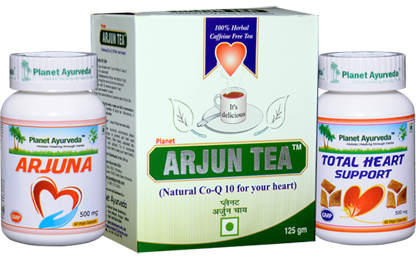Herbal Remedies for Mitral Valve Prolapse in Ayurveda
Abstract
The heart is a muscular organ present in the body that helps in pumping blood. The human heart is divided into four chambers where two of them are atria and the other two are ventricles. The blood present in our body passes through the valve before reaching out the chambers of the heart and these valves are responsible for preventing the backward flow of the heart. These valves are basically flaps except the mitral valve which is located between the left atrium and ventricle. Let’s discuss the Mitral valve more in detail and how its prolapse can affect the body along with its herbal treatment.

What is the Mitral Valve?
This valve is also known as the bicuspid valve and prevents the backflow of blood. The oxygen-rich blood goes into the left atrium which comes from the pulmonary vein. When the left atrium is filled with blood the mitral valve opens which allows the movement of blood to the left ventricle. This then closes which prevents the flow of blood back into the left atrium. All this process occurs in a matter of seconds or heartbeats.
Different parts and their function:-
- Leaflets:- The mitral valves have two leaflets which are the projection for closing and opening. One of the parts is known as anterior leaflet which is basically semicircular in structure and is attached to two-fifths of the mitral valve area. The other part is better known as the posterior leaflet and is attached to the remaining third-fifth of the valve.
- Commissures:- It is the area where the posterior and anterior leaflets of the commissure meet.
- Chordae tendineae:- It is a connective structure in the form of a fan shape that connects the leaflets to the papillary muscles of the heart. They help in maintaining the connection between the mitral valve and the left ventricle so that it can easily close and open with less tension.
- Zone of coaptation:- It is present on the top of the valve surface which is rough. It is the zone where the chordae tendineae meets the mitral valve to the papillary muscles. It is one of the small portions present in the mitral valve but even a small irregularity can affect the normal functioning of the heart.
- Mitral annulus:- It is a ring attached to the mitral valve and it helps in connecting the tissue to the left ventricle as well as an atrium.
All these parts play a very important role in the normal functioning of the heart and one of the conditions that can affect the heart is Mitral valve prolapse.
What is Mitral Valve Prolapse?
It is also known as the Floppy mitral valve and one of the most common causes of mitral regurgitation. Mitral valve prolapse is mainly caused due to degenerative myxomatous changes and it is sometimes one of the features present in connective tissue disorder known as Marfan’s syndrome. In this condition, the flaps present in the mitral valve do not close properly and this condition is also known as Barlow’s syndrome.
In the mildest form, the valve remains capable of working but there is a mild bulging back of the atrium during systole resulting in mild-systolic click and no murmur. In later stages, the systolic murmur can occur in the patient with the presence of a regurgitant. The murmur increases as the regurgitation becomes more severe and the combination of click as well as a late systolic murmur is one of the hallmark symbols for mitral prolapse. Progressive elongation of the chordae tendineae may result in mitral regurgitation that may become severe. Mitral valve can also result in increased arrhythmias and this normally begins slowly but some patients may suffer from bizarre as well as frequent arrhythmias. Mitral prolapse is common in young people with embolic stroke but the chances of complications are less.
Other names given to mitral valve prolapse are:-
- Floppy valve syndrome
- Billowing mitral valve syndrome
- Barlow’s syndrome
- Myxomatous mitral valve disease
What are the Signs and Symptoms?
Here are some clinical features presented in the disease and this includes:-
Acute mitral regurgitation:-
- Acute pulmonary oedema
- Reduced cardiac output.
Chronic progressive mitral regurgitation:-
- Nocturnal dyspnoea
- Palpitation
- Atrial flutter
- Pulmonary oedema is especially seen in pregnant women.
- Swelling in abdomen
- Diminished cardiac output
- Oedema in feet and leg
- Dizziness
- Fatigue
- Shortness of breath.
Complications
Although in most of the patients the mitral valve prolapse is not noted but there are some complications including:-
- Mitral valve regurgitation:- The most commonly seen complication in the disease is regurgitation where the valve starts to leak the blood back to the left atrium. Health conditions like blood pressure increases the risk of developing mitral valve regurgitation.
- Heart rhythm problem:- Irregular heart rhythms are very commonly seen in the upper chambers of the heart and this is quite disturbing for some patients. Patients who have severe mitral valve regurgitation most commonly develop deformity in their mitral valve that results in rhythm problems.
- Heart valve infection:- The internal part of the heart is lined with a layer of membrane called endocardium. The infection of inner lining is very commonly seen which further results in mitral valve damage.
What Causes Mitral Valve Prolapse?
One of the main causes for mitral valve prolapse is heart regurgitation can be resulted because of the dilatation of the mitral valve ring in association with disease and this can be involved with Diptheria, extensive infarction, rheumatic fever, myocarditis, or cardiomyopathy.
In some people the mitral valve prolapse of one or both leaflets have extra tissue and they stretch more than normal, this results in bulging of the left atrium like a parachute each time when the heart contracts. This bulge closes the valve tightly and in some of the cases the blood starts to leak backward through the valve.
Some Risk Factors
Mitral valve prolapse can develop at any age and both genders are equally affected. These symptoms are very commonly seen in patients above the age of 50. It can also run in patients and could also be linked to other conditions called:-
- Marfan syndrome
- Ehlers-Danlos syndrome
- Ebstein anomaly
- Muscular dystrophy
- Graves disease
- Scoliosis
How Mitral Valve Prolapse can be Diagnosed?
One of the important things done is a physical examination where the heart rhythm is examined through a stethoscope. If the patient has mitral valve prolapse then you might notice a clicking sound which is very common in this condition. This occurs due to leaking of blood back into the left atrium.
Clinical Examination
- Echocardiogram:- In this test high-frequency sound waves are used which makes an image of the heart. It helps in recording the blood flow through the mitral valve and measuring the amount of blood leaking.
- Chest X-ray:- This will show the images of lungs, heart and blood vessels that helps in diagnosis. It is helpful in showing the enlargement of the heart.
- Electrocardiogram:- It is an noninvasive test where problems are placed on the chest that helps in recording the electrical impulses of the heart beat.
- Stress test:- In the mitral valve prolapse the ability to exercise is reduced and in this test the patient is told to perform exercise to increase the heart rate.
Treatment
Most of the time patients with mitral valve do not show any symptoms and there is no requirement for treatment. Allopaths will provide medications like heart rhythm medications like pacerone, sotalol, propafenone which helps in normalizing the heart beat and many other medicines like beta-blockers, diuretics etc. Along with that blood thinners like warfarin, rivaroxaban etc are given and these medications bring many more drawbacks as well as side-effects.
According to Ayurveda valvular heart disease is considered as Kabhatika Hridroga caused due to imbalance of vata, rakta, rasa and mamsa. Herbal medicine helps in treating the disease by naturally removing the root cause of the disease and making the overall health of the heart better.
Herbal Remedies for Mitral Valve Prolapse By Planet Ayurveda
Herbal medicine provided by Planet Ayurveda is 100 percent pure, natural, and vegetarian. Each herbal medicine is free from chemicals, preservatives, additives as well as colors. Every herbal remedy is made under the supervision of an MD Ayurvedic Doctor along with that they are all clinically tested as well. Here is the list of herbal medicine that will help in treating the disease naturally:-
Product Description
1. Arjuna Capsules
It is made from herbs like Arjuna (Terminalia arjuna) which is one of the best herbs for the heart. It contains anti-inflammatory as well as analgesic properties that help in reducing ailments related to mitral valve prolapse. This herbal medicine strengthens the muscles present in the heart and enhances the circulation around the coronary artery.
Dosage:- Two capsules twice daily with water after meals.
2. Arjun Tea
This tea can be taken on the daily basis which is packed with herbs like Arjuna (Terminalia arjuna), Dalchini (Cinnamomum zeylanicum), Punarnava (Boerhavia diffusa) and many more. This herbal medicine contains cardiac glycosides, poly-phenol, anti-oxidant properties which are effective in fighting all the problems caused during aging. It is very helpful in clearing the blocked arteries and is very effective in increasing good cholesterol.
Dosage:- One cup of tea twice daily.
3. Total Heart Support
As the name suggests it is one of the effective herbal medicines for maintaining the good health of the heart. It is made from the combination of herbs like Arjuna (Terminalia arjuna), Ashwagandha (Withania somnifera), Shankhpushpi (Convolvulus pluricaulis) and Brahmi (Bacopa monnieri). It is very effective in treating heart disease like myocardial infarction, angina and many more by cleansing the arteries.
Dosage- 2 capsules twice daily with plain water after meals.
Conclusion
The article explains everything about mitral valve disease and its effect on the overall health. It is very important to maintain a healthy heart and that is how the beat goes on. Above all, herbal medicine is very effective in treating heart disease and maintaining good health.







